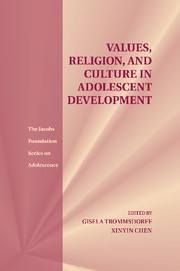Book contents
- Values, Religion, and Culture in Adolescent Development
- Series page
- Values, Religion, and Culture in Adolescent Development
- Copyright page
- Dedication
- Contents
- Contributors
- Preface
- Acknowledgments
- Part One Theoretical Perspectives on Values, Religion, and Adolescent Development in Cultural Context
- Part Two Universal and Culture-specific Functions of Adolescent Values and Religion
- Part Three Impact of Values and Religion on Adolescent Adjustment in Times of Social Change
- Part Four Socialization Processes of Values and Religion in Adolescent Development
- 14 Attachment and Religious Development in Adolescence The Implications of Culture
- 15 Cross-Cultural Perspectives on Adolescents’ Religiosity and Family Orientation
- 16 Religion and the Intergenerational Continuity of Values
- 17 Adolescents’ Social Development and the Role of Religion
- 18 Hindu Religious Values and Their Influence on Youths in India
- Index
16 - Religion and the Intergenerational Continuity of Values
from Part Four - Socialization Processes of Values and Religion in Adolescent Development
Published online by Cambridge University Press: 05 September 2012
- Values, Religion, and Culture in Adolescent Development
- Series page
- Values, Religion, and Culture in Adolescent Development
- Copyright page
- Dedication
- Contents
- Contributors
- Preface
- Acknowledgments
- Part One Theoretical Perspectives on Values, Religion, and Adolescent Development in Cultural Context
- Part Two Universal and Culture-specific Functions of Adolescent Values and Religion
- Part Three Impact of Values and Religion on Adolescent Adjustment in Times of Social Change
- Part Four Socialization Processes of Values and Religion in Adolescent Development
- 14 Attachment and Religious Development in Adolescence The Implications of Culture
- 15 Cross-Cultural Perspectives on Adolescents’ Religiosity and Family Orientation
- 16 Religion and the Intergenerational Continuity of Values
- 17 Adolescents’ Social Development and the Role of Religion
- 18 Hindu Religious Values and Their Influence on Youths in India
- Index
Summary
Adolescence is an important period for the development of values and identity. As relationships with parents are negotiated and convictions are questioned, it is an especially intriguing time to study the interface of religion with processes leading to the intergenerational continuity of values. Religion can provide the content of values, as well as the context of intergenerational value continuity, by developing appropriate establishments, and by enabling (or not) disengagement from parental values. In addition, individuals’ religiosity is reflected in their values and in family processes of value negotiation, influence, and modification.
Two Israeli case studies illustrate these processes. Study 1 studied 107 parent–adolescent dyads from three religious minorities in Israel: Muslim Arabs, Christian Arabs, and Jerusalem Armenian Christians. Muslims ascribed less importance than Christians to hedonism and power, exemplifying the content process. Armenians, a very small and secluded minority, were the only group in which adolescents ascribed lower importance for openness than their parents, exemplifying the role of context with a cocooning process, in which socialization shields children from competing messages (Goodnow, 1997).
Study 2 involved 36 non-religious Jewish youth whose parents were either religious or not. The average value profile parent–child correlation was .50 in non-religious families, much higher than in families who had been religious but decided to become non-religious (.18), exemplifying the importance of religion.
Future directions include the need for studying non-Western religions and family processes in religious as compared to ethnic minorities.
- Type
- Chapter
- Information
- Values, Religion, and Culture in Adolescent Development , pp. 370 - 390Publisher: Cambridge University PressPrint publication year: 2012
- 1
- Cited by

